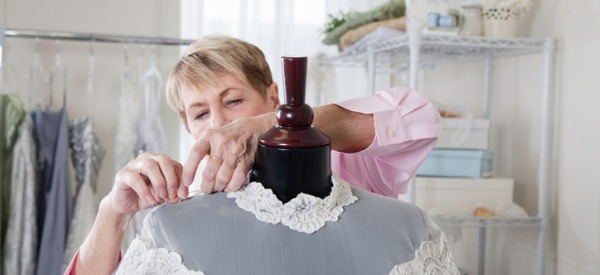What is a Hand Sewer?
A hand sewer is a professional who sews textile goods by hand. Many hand sewers make clothing, while others focus on curtains, upholstery and other fabric goods. Although many tasks formerly done by hand sewers are now automated, hand sewing is still invaluable in many applications, including embroidery, beading and bespoke clothing creation.
What does a Hand Sewer do?
Hand sewers sew by hand, plain and simple. Some common tasks performed by a hand sewer include creating patterns, cutting out the pieces and sewing them together. Hand sewers are in great demand in the quilting industry; many also work in alterations. Many types of clothing, such as formal gowns, suits and tuxedos, may be purchased "off the rack" but need to be tailored for a perfect fit; most of these alterations are delicate and must be done by hand.

Hand sewers are also in demand in the fashion industry, where they create intricate beading designs and add embroidery by hand. A hand sewer may also make custom corsets. Corsetry is a difficult and complicated art that requires a fine aesthetic eye, a steady hand and a knowledge of materials; hand sewers who work in this field must be comfortable working with various boning materials and know the tensile strength of various fabrics used in corset fabrication. Mistakes in such calculations may cause a corset to burst open during wear.
Hand sewers often create and customize clothing patterns and design custom clothing for couture customers. Excellent knowledge of materials is essential for this job. As well, the sewer must know the properties of many different fabrics and the applications for which they're best suited. Furthermore, the sewer must understand the client's body type and select fabrics and flattering designs based on that information. To that end, a hand sewer must also be a diplomat; clothing size and body type are very emotional issues for many people, and a hand sewer may need to explain, as tactfully as possible, why a certain fabric or a certain cut of clothing is not flattering for the client.
The antiques and upholstery trades rely heavily upon hand sewers. Those who specialize in antique restoration need a solid understanding of historical design principles and a high degree of spatial intelligence so that they may visualize the best way to fix damaged upholstery without breaking the design conventions of the period in question. Antiques that are extremely old or badly damaged require an especially delicate hand; the restoration specialist is responsible for removing the damaged upholstery and installing the new, all without scratching, scuffing or otherwise marring the wood or metal frame.
Hand sewers are in high demand in the entertainment industry, particularly in opera and musical theatre. Many small theatre companies rent all their costumes, but these need to be temporarily altered to fit the specific performers who will wear them. Temporary alterations can be incredibly difficult; the sewer must alter the garment in a way that can be easily reversed when the costumes are returned to the rental company. They should expect to be on call during evening and weekend performances, and may need to perform emergency repairs on an important costume that's been damaged during a show. In some situations, the sewer may have only several minutes to fix a popped button or torn strap because the costume - and its occupant - are due back on stage for the next scene.
What is the workplace of a Hand Sewer like?
Hand sewers may work in a variety of settings. Those who specialize in tailoring and alterations may work at a dry cleaner's, or have a small storefront in a strip mall. Others work from their homes, where they have more space and reduced overhead costs. Sewers who work in the entertainment industry normally work in costume shops and theatrical warehouses; however, they must often work in darkened theatres as well - particularly in the days leading up to opening night. Artisanal hand sewers who work for couture designers may work in large factories and warehouses; those who specialize in beading elaborate couture wedding gowns may work at a bridal salon or a larger warehouse environment.
Hand Sewers are also known as:
Alteration Specialist
Coutierier